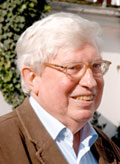|
Gerhard Ertl Wins Nobel Prize in Chemistry 2007

World Scientific Editorial Board member, Professor Gerhard Ertl has been awarded the Nobel Prize in Chemistry 2007 for "his studies of chemical processes on solid surfaces". This is the first Nobel Prize award for surface chemisty since 1932, which went to Irving Langmuir.
Professor Ertl has long been associated with the Surface Review and Letters (SRL). Besides serving on its editorial board, his papers "Structural Properties of Alkali-Metal Atoms Absorbed on Ru(001)" and "On the Dissociation of O2 on Alkali Metals" have also been published in SRL.
Born in 1936, Professor Ertl teaches and works at the Fritz-Haber-Institut der Max-Planck-Gesellschaft in Germany. He is known for determining the detailed molecular mechanisms of the catalytic synthesis of ammonia over iron (Haber Bosch process) and the catalytic oxidation of carbon monoxide over palladium (catalytic converter). During his research he discovered the important phenomenon of oscillatory reactions on platinum surfaces and, using photoelectron microscopy, was able to image for the first time, the oscillating changes in surface structure and coverage that occur during reaction.
Professor Ertl believes that the heterogeneous catalysis work which his group engages in is a topic of great industrial importance, and also of environmental importance. "Think of the car exhaust catalsyst, or of all these industrial processes. So, as soon as you understand something better then you can also think of improving it. I think that's the main message you can learn from it."
When asked by Adam Smith, editor-in-chief of Nobelprize.org on what lessons his doctoral students should learn from him, Professor Ertl replies "I think you never should give up, you should always try to solve the problem as far as it is possible. And you must be patient. You must be patient. That's very important."
The prize announcement came on the day Professor Erlt celebrated his 71st birthday.
|


